|
|
|
Sort Order |
|
|
|
Items / Page
|
|
|
|
|
|
|
| Srl | Item |
| 1 |
ID:
079237
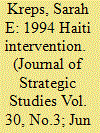

|
|
|
|
|
| Publication |
2007.
|
| Summary/Abstract |
Observers of United States (US) interventions have almost universally characterized the 1994 Haiti intervention as multilateral, a model for how international cooperation can achieve common security goals. A closer analysis of the intervention reveals that the planning and execution of the intervention were almost entirely unilateral and therefore cost the US few if any of the theoretical costs of coalition warfare, including interoperability and policy compromise. Mapped onto the unilateral strategy and operation of the intervention, however, was a multilateral diplomatic effort that secured United Nations Security Council authorization and provided a cover for an intervention that the US had already planned and intended to execute with or without that authorization. That the US sought a multilateral cover for an intervention that it could easily accomplish unilaterally shows the importance of two factors: A domestic audience that opposed unilateral peacekeeping but would accept using US resources as part of a broader multilateral operation, and a local population that would be more responsive to a multilateral coalition than a use of force that was perceived to be unilateral. The Haiti intervention shows that the determinants of success in operations other than war are as much political as military. When the US already has overwhelming military superiority vis-à-vis its adversary, building military coalitions becomes as much about enlisting political support as aggregating material capability.
|
|
|
|
|
|
|
|
|
|
|
|
|
|
|
|
| 2 |
ID:
140729
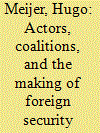

|
|
|
|
|
| Summary/Abstract |
In light of the intertwining logics of military competition and economic interdependence at play in Sino–American relations, this paper examines how the United States has balanced conflicting national security and economic interests in the making of US export control policy on defense-related technology toward China. Relying upon a large body of primary sources (including 170 interviews), it seeks to contribute to the understanding of this strategically sensitive yet neglected area of Sino–American relations. It is shown that, as a consequence of the erosion of the US capacity to control the diffusion of defense-related technology to China in the post-Cold War era, a growing set of actors within the United States has reassessed the security/economic calculus in Washington's relationship with Beijing. Specifically, this coalition advocates the streamlining of export controls to sustain the defense and technological industrial base and thereby maintain American military/technological preeminence vis-à-vis a rising China.
|
|
|
|
|
|
|
|
|
|
|
|
|
|
|
|
| 3 |
ID:
147960
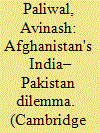

|
|
|
|
|
| Summary/Abstract |
This article seeks to examine the foreign policy behaviour of weak states in regions marked by politically turbulent geostrategic environments. An analysis of Afghanistan's foreign policy behaviour vis-à-vis Pakistan and India lends focus to this aim. India–Pakistan rivalry has gained traction as a key factor in determining Afghanistan's stability in the wake of the drawdown of Coalition forces. Missing from this debate, however, is consideration of Afghanistan's agency as a weak state with an independent set of policy preferences. Based on primary interviews with a diverse set of Afghan political actors the article outlines two competing policy advocacies: Pakistan friendly and Pakistan averse. The article argues that these advocacies are key to understanding Afghanistan's India–Pakistan dilemma. Departing from the ethnic lens used to explain Afghan politics and its regional linkages, this article shows that Kabul's relations with Islamabad determine its approach towards New Delhi regardless of ethnic rivalries. Understanding domestic Afghan narratives in this regional context is therefore imperative to adequately assess South Asia's prospective security calculus.
|
|
|
|
|
|
|
|
|
|
|
|
|
|
|
|
| 4 |
ID:
146456
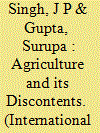

|
|
|
|
|
| Summary/Abstract |
The demise of the Doha round of trade negotiations is often attributed to deadlocks in agricultural negotiations between the developed and the developing world. Why has agriculture been so difficult to negotiate? This article explains North-South agricultural negotiations through the lens of coalition politics, especially the shift from bloc to issue-based diplomacy from the developing world. We argue against the proposition in the negotiation literature that multiple coalitions at the international level allow negotiators room to maneuver. Our study shows that bloc coalitions in fact allowed for compromise more than issue-based coalitions in agriculture, which are often supported by strong domestic constituencies. Empirically, the article focuses on the Uruguay Round when the North and South struck an agreement on agriculture and the Doha Round, which remains deadlocked. The article also provides an in-depth case study of India’s agricultural interests and its food security program in the context of the WTO.
|
|
|
|
|
|
|
|
|
|
|
|
|
|
|
|
| 5 |
ID:
117834


|
|
|
|
|
| Publication |
2012.
|
| Summary/Abstract |
This article provides a working taxonomy of the concept of 'alignment' in the discipline of International Relations (IR); a heretofore major deficiency in the otherwise abundant literature on alliance/alignment. It further contends that the label 'alliance' is commonly employed reflexively and unreflectively, where in fact the term 'alignment' would be a superior and more accurate descriptor. This contention is buttressed by empirical developments in international politics. The article makes the case that the contemporary security environment is characterised by multiple forms of 'alignment', not just alliances, in their many guises. In addition, we can identify 'coalitions', 'security communities', and 'strategic partnerships'; all distinctly different from the conventional 'alliance' archetype. It concludes that a change in our thinking about defining and conceptualising alignment and alliance is required to bring disciplinary work closer in line with the paradigmatic shift that is occurring in contemporary international politics.
|
|
|
|
|
|
|
|
|
|
|
|
|
|
|
|
| 6 |
ID:
101822


|
|
|
|
|
| Publication |
2011.
|
| Summary/Abstract |
This article examines how Turkish citizens participated in protests against the Iraq War and why civil society organizations were able to mobilize tens of thousands of people across the country despite the institutional weakness of the Turkish peace movement. The Iraq War case is important in that its scale and level of protest mobilization were unprecedented based on any other anti-war protests in Turkey. Using content analysis of newspaper reports of anti-Iraq War protest events, this article maps the patterns and forms of protest against the Iraq War and argues for the importance of global networks, coalitions among organizations, and political context for protest mobilization.
|
|
|
|
|
|
|
|
|
|
|
|
|
|
|
|
| 7 |
ID:
124412
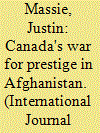

|
|
|
|
|
| Publication |
2013.
|
| Summary/Abstract |
This article provides a comprehensive assessment of Canada's prolonged and sizable military engagement in the war in Afghanistan in light of confounding expectations set by realism. It argues, from the perspective of neoclassical realism, that United States unipolarity, domestic elite consensus on an Atlanticist security policy, and executive autonomy vis-à-vis public dissent best account for Canada's evolving Afghanistan policy. These necessary conditions can be generalized to apply to past and future allied coalitions of the willing to help make sense of Canada's alliance burden-sharing.
|
|
|
|
|
|
|
|
|
|
|
|
|
|
|
|
| 8 |
ID:
102748
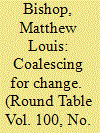

|
|
|
|
|
| Publication |
2011.
|
| Summary/Abstract |
In May 2010 two elections took place in traditional 'Westminster' polities-the United Kingdom and Trinidad and Tobago-in which coalition governments took power. In both countries, a significant part of the discourse in the run-up to election focused on the inequities of the Westminster model, and, in particular, first-past-the-post. Yet, interestingly, the end result in many ways mirrors the kind of outcome often championed by supporters of more proportional electoral systems. This article compares and contrasts the two different elections, and asks whether such coalitions are set to become a regular feature of a more mature Westminster model.
|
|
|
|
|
|
|
|
|
|
|
|
|
|
|
|
| 9 |
ID:
138082
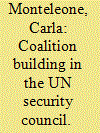

|
|
|
|
|
| Summary/Abstract |
Political coalitions in the international system are still understudied in International Relations theory. This article claims that the formation of and variations in coalitions in the international system are affected by changes in their bargaining power and bargaining environment related to the global leadership cycle and by long-term organisational changes of the international political system. Identifying the Security Council as the institution in which states are more likely to keep their systemic preferences at the institutional level, the article studies the presence, formation and change of coalitions in the international system by testing variations in the behaviour of the Security Council members in the period 1993–2012. To overcome methodological difficulties, it proposes to analyse sponsoring rather than voting behaviour. In the analysed period, the presence of a mutating dominant coalition, signs of potential coalitions in the making and an increase in participation and competition resulting from modifications in the organisational form of the international system are found.
|
|
|
|
|
|
|
|
|
|
|
|
|
|
|
|
| 10 |
ID:
104836


|
|
|
|
|
| Publication |
New Delhi, Viva Books, 2011.
|
| Description |
ix, 259p.
|
| Standard Number |
9788130915241, hbk
|
|
|
|
|
|
|
|
|
|
|
|
Copies: C:1/I:0,R:0,Q:0
Circulation
| Accession# | Call# | Current Location | Status | Policy | Location |
| 056100 | 956.7044/BAL 056100 | Main | On Shelf | General | |
|
|
|
|
| 11 |
ID:
119438
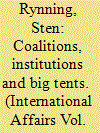

|
|
|
|
|
| Publication |
2013.
|
| Summary/Abstract |
Armed interventions of the past decades demonstrate that strategic leadership can give way to lofty campaign plans, conflicting strategic narratives and concern with tactical, as opposed to strategic, issues. The intervention debate rightfully emphasizes the need for both leadership and institution-building to rectify this situation, but then breaks down into discord: some critics argue that stronger leadership by big nations is necessary, others that this type of leadership wrecks the collective institutions that are needed in a new age of multilateralism and interdependence.
This article argues instead that strategic leadership grows out of the effort to connect the three distinct political arenas that have come to dominate armed interventions: coalitions, institutions and big tent diplomacy. Strategic leadership is not about choosing between coalitions or institutions; it is about building bridges among these political arenas.
The article embeds this argument within the strategic literature and demonstrates how it emerges from an engagement with modern armed interventions. It engages in two in-depth assessments of NATO's experiences in Afghanistan and Libya and then undertakes a more general discussion of the steps that can be taken to encourage strategic leadership.
|
|
|
|
|
|
|
|
|
|
|
|
|
|
|
|
| 12 |
ID:
112859
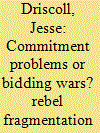

|
|
|
|
|
| Publication |
2012.
|
| Summary/Abstract |
After highly fragmented civil wars, order is often secured through the selective co-optation of rebel field commanders and atomized insurgents. This paper presents a formal model of civil war settlement as a coalition formation game between various regime and rebel factions. This approach emphasizes the ability of installed civilian rulers to lure warlords into the state based on promises of future wealth, then use divide-and-rule tactics to pit different warlord factions against one another. Quantitative and qualitative data from Tajikistan, including an original data set of warlord incorporation and regime purges during wartime reconstruction, are used to evaluate the model.
|
|
|
|
|
|
|
|
|
|
|
|
|
|
|
|
| 13 |
ID:
114812
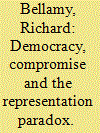

|
|
|
|
|
| Publication |
2012.
|
| Summary/Abstract |
Coalitions are often condemned as undemocratic and unprincipled because of the compromises they involve. Politicians are accused of betraying the commitments they made during the election. Paradoxically, proponents of this view suggest that if compromises are to be made they should be pragmatic and based on policy rather than principle. This article disputes this thesis and defends compromise as both principled and democratic. The first section distinguishes a shallow compromise based on the maximal satisfaction of exogenously defined preferences from a deep compromise resulting from reasoning on principle, and argues it proves impossible to avoid the latter. The second section suggests that the obligation to compromise forms part of the ethos of democracy, whereby citizens must agree despite their disagreements. The third section concludes by showing that while representatives will almost certainly betray their electoral mandate if obliged to make only shallow compromises, they can legitimately engage in deep compromises for their voters when they reason as they do.
|
|
|
|
|
|
|
|
|
|
|
|
|
|
|
|
| 14 |
ID:
138424


|
|
|
|
|
| Summary/Abstract |
The knowledge economy, deindustrialization, and the decline of Fordism have undermined the economic complementarities that once existed between skilled and semiskilled workers. The result has everywhere been a decline in coordinated wage bargaining and unionization and a notable rise in labor market inequality. Yet, the political responses have been very different across advanced democracies. While labor markets for part-time and temporary employment have been deregulated across the board, some countries have compensated losers through increased cash transfers and active labor market programs and others have allowed inequality and insider-outsider divisions to grow deeper. The article argues that the divergent government responses reflect differences in underlying electoral coalitions, and that these in turn mirror the structure of party and electoral systems. The authors support their argument with evidence for government responses to economic shocks in the period 1980 to 2010.
|
|
|
|
|
|
|
|
|
|
|
|
|
|
|
|
| 15 |
ID:
165248
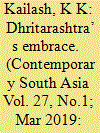

|
|
|
|
|
| Summary/Abstract |
Why do we find more parties from Tamil Nadu in the Lok Sabha compared to Kerala and why are there more parties in the legislative assembly in Kerala compared to Tamil Nadu? This incongruence is puzzling since elections to both levels of government, federal and state, are based on the single-member simple plurality electoral system and the territorial boundaries of the state, and therefore the societal environment remains constant. This article argues that this incongruence is not merely the product of the federal parliamentary structure of the polity, electoral rules, and socio-economic factors but because of what parties do. This article gives agency to parties and brings party strategy to the centre of the analysis.
|
|
|
|
|
|
|
|
|
|
|
|
|
|
|
|
| 16 |
ID:
121816
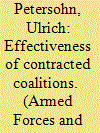

|
|
|
|
|
| Publication |
2013.
|
| Summary/Abstract |
The debate on the effectiveness of Private Security Contractors (PSCs) in Iraq has been waged ever since their first appearance. Statists have argued that they are much less effective than regular troops, while neoliberals consider them an effective supplement to regular troops. However, so far, both schools alike have drawn on anecdotal evidence only; yet, such evidence is prone to a high margin of error and does not allow a comparison of different actors. This article addresses these shortfalls by providing hard data, drawn from the Wikileaks "Iraq War logs" data set, on the conduct of PSCs in Iraq and comparing their performance to that of regular troops, that is, the US and Iraqi armed forces. In general, if PSCs are co-deployed alongside regular troops and oversight is institutionalized, their performance supersedes that of poorly trained military personnel, such as the Iraqi military, and in many cases even that of the highly capable US military.
|
|
|
|
|
|
|
|
|
|
|
|
|
|
|
|
| 17 |
ID:
186094
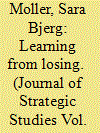

|
|
|
|
|
| Summary/Abstract |
When and why do coalitions adapt in wartime? Drawing on insights from organizational research and bargaining theories of war, this paper develops a model of coalitional military adaptation. I argue that coalition members are slow to adjust their wartime fighting arrangements owing to collective action problems as well as the military and political practicalities inherent in coalition warfare. I illustrate my argument with a case study of the Austro-German coalition in World War I.
|
|
|
|
|
|
|
|
|
|
|
|
|
|
|
|
| 18 |
ID:
166605
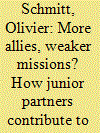

|
|
|
|
|
| Summary/Abstract |
There is a growing consensus that multinational military operations are often less effective than the theoretical sum of their constitutive parts. Multiple chains of command, restriction on intelligence sharing, and capability aggregation problems can reduce fighting power. However, partners may be necessary to provide legitimacy to an intervention. As such, most studies assume that the state leading a coalition (usually the United States) has to accept a degree of operational ineffectiveness in order to gain political benefits from the participation of junior partners to a multinational military operation. However, such analysis puts all junior partners under the same category, without taking into account the differentiated contributions of those junior partners based on their relative military power and international status. This article explores variation between the junior partners’ contributions and their impact on coalition political and military dynamics. It teases out the implications of adopting a fine-grained analysis of junior partners.
|
|
|
|
|
|
|
|
|
|
|
|
|
|
|
|
| 19 |
ID:
172318
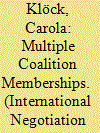

|
|
|
|
|
| Summary/Abstract |
This study explores multiple coalition memberships in multilateral negotiations, with a focus on climate negotiations. Why do countries engage in multiple coalitions, and how do multiple coalition memberships affect their influence? I argue that coalitions differ in important respects. Accordingly, countries may belong to both, long-term and short-lived coalitions; they may consciously decide to join a coalition, but also be associated by default. Finally, larger coalitions confer numerical strength, while smaller (sub-)coalitions help voice common positions. Regarding effects, I propose two perspectives. The zero-sum perspective highlights coordination costs and potentially incompatible positions, while the win-win perspective focuses on the complementarity of different coalitions and the potential for mutual support. Anecdotal evidence from the climate negotiations offers support for these perspectives, but further empirical research is needed to better understand why countries join several coalitions, how they navigate these multiple coalition memberships, and how these affect their influence.
|
|
|
|
|
|
|
|
|
|
|
|
|
|
|
|
| 20 |
ID:
185892


|
|
|
|
|
| Summary/Abstract |
In 2017, Tokyo held landmark prefectural elections featuring a new regional party, Tokyoites First. Fueled by the popularity of Governor Yuriko Koike, Tokyoites First gained legislative control through an alliance with Komeito, relegating the Liberal Democratic Party (LDP) to opposition status. The alliance was surprising, especially since Komeito remained a national coalition partner with the LDP. Why would Komeito, a junior partner in a long-standing national alliance with the LDP, simultaneously ally with another party against the LDP subnationally? What explains such incongruence, or alliance juxtaposition, where a party has different partners across administrative tiers? We explain this dalliance in terms of institutional factors and party strategy. Tokyo’s distinctive voters and electoral system made for novel coalition opportunities. Strategically, Komeito’s fling signaled its autonomy to supporters and to LDP leaders, showing that its loyalty cannot be assumed.
|
|
|
|
|
|
|
|
|
|
|
|
|
|
|
|
|
|
|
|
|